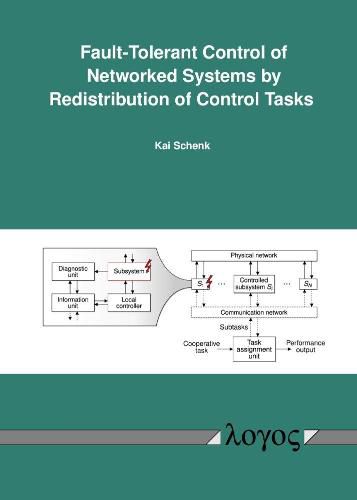Readings Newsletter
Become a Readings Member to make your shopping experience even easier.
Sign in or sign up for free!
You’re not far away from qualifying for FREE standard shipping within Australia
You’ve qualified for FREE standard shipping within Australia
The cart is loading…






This thesis deals with networked systems that together have to exhibit a desired common behavior, in other words, they have to satisfy a cooperative task a
even when a subsystem is affected by a fault. This requires a coordination of the subsystems, which is achieved by a suitable decomposition of the cooperative task into local control tasks. As the focus is given to the subsystemsa
common behavior, the decomposition can be changed as long as the cooperative task keeps being accomplished. This introduces redundancy to the overall system, which is important for fault-tolerant control because the cooperative task can be satis ed in multiple ways. If faults are causing subsystems to malfunction, their control tasks can be redistributed among the remaining healthy systems. Hence, faults can be compensated by means of cooperation.
The aim of this thesis is to combine three topics of control theory: Networked systems, fault-tolerant systems, and cooperating systems. This combination is referred to as fault-tolerant task assignment in networked systems. This thesis answers the question: How can a exible assignment of control tasks help to prevent that malfunctions of subsystems adversely affect the accomplishment of a cooperative task?
$9.00 standard shipping within Australia
FREE standard shipping within Australia for orders over $100.00
Express & International shipping calculated at checkout
This thesis deals with networked systems that together have to exhibit a desired common behavior, in other words, they have to satisfy a cooperative task a
even when a subsystem is affected by a fault. This requires a coordination of the subsystems, which is achieved by a suitable decomposition of the cooperative task into local control tasks. As the focus is given to the subsystemsa
common behavior, the decomposition can be changed as long as the cooperative task keeps being accomplished. This introduces redundancy to the overall system, which is important for fault-tolerant control because the cooperative task can be satis ed in multiple ways. If faults are causing subsystems to malfunction, their control tasks can be redistributed among the remaining healthy systems. Hence, faults can be compensated by means of cooperation.
The aim of this thesis is to combine three topics of control theory: Networked systems, fault-tolerant systems, and cooperating systems. This combination is referred to as fault-tolerant task assignment in networked systems. This thesis answers the question: How can a exible assignment of control tasks help to prevent that malfunctions of subsystems adversely affect the accomplishment of a cooperative task?